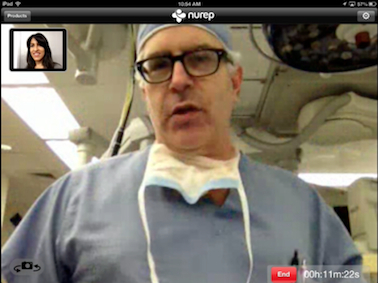 A newly launched company is trying to streamline support for medical devices, make surgical scheduling more convenient and lower the overall cost of pricey equipment by facilitating secure video consultations on the iPad.
A newly launched company is trying to streamline support for medical devices, make surgical scheduling more convenient and lower the overall cost of pricey equipment by facilitating secure video consultations on the iPad.
San Francisco-based startup Nurep, part of digital health accelerator Blueprint Health's winter 2013 class, debuted its mobile physician support platform at the annual Demo Mobile conference last week. Nurep was among 29 companies – four of them healthcare-related – to demonstrate products at the event, and was part of the opening session specific to mobile health.
The idea behind the product is that medical devices frequently need support from sales and technical representatives during surgical procedures, according to Nurep co-founder Paul Schultz. Reps' territories are getting larger and larger as many device companies look to reduce expenses in the face of falling reimbursements for surgical procedures, the new 2.3 percent tax on medical devices as a result of the Patient Protection and Affordable Care Act, as well as other cost pressures.
Customer service and support representatives often are present in the operating room to answer questions on the spot, with the exception of some centers of excellence where the surgical teams are highly trained on specialized equipment, according to Schultz. "This is the dirty little secret of surgery, medical device reps being there," he tells MobiHealthNews. Surgical consent forms often contain fine print allowing reps to be on hand.
"Physicians are really frustrated because they are relying on the reps' schedules" to set surgery times, says Schultz.
Another little-known reality, according to Schultz, is that 60 percent of the price of the typical medical device covers selling, general and administrative expenses, commonly known as SG&A, and hospitals are looking to cut their costs. However, the target market is the medical device industry.
"We developed this for medical device companies to support physicians," Schultz says. "We bring a live, remote medical device rep in to the operating room," he continues, and Nurep will guarantee 24/7 availability once the service gets a full rollout later this year. "It seamlessly integrates into the physician's workflow," Schultz says, making a bold statement that can only be verified in real-world conditions.
 Nurep transmits live video between Apple iOS devices – mostly iPads – with a proprietary platform that Schultz calls secure and HIPAA-compliant. The technology works even when bandwidth is limited by reducing the screen resolution as necessary to maintain smoothness of image motion. A rep can pinch-zoom the image to get a closer look at the surgical site.
Nurep transmits live video between Apple iOS devices – mostly iPads – with a proprietary platform that Schultz calls secure and HIPAA-compliant. The technology works even when bandwidth is limited by reducing the screen resolution as necessary to maintain smoothness of image motion. A rep can pinch-zoom the image to get a closer look at the surgical site.
Surgical teams access the Nurep platform on an iPad kept in a sterile bag once a procedure starts. Users can contact their designated company rep or let a Nurep algorithm select an alternative.
The app identifies the surgeon's location and makes a "sonar-like" match to the closest suitable rep, according to Schultz. Though Nurep works over the Internet, Schultz says device companies like to preserve territorial relationships between sales and support people and their customers, while hospitals and physicians also can set preferences.
The company chose the iPad because of its popularity among physicians and device makers alike. Schultz reports getting a lot of interest from emergency departments, particularly those with trauma units that might need to perform high-risk surgeries with sophisticated equipment at any hour of the day or night.
In future releases, Schultz promises additional features like the ability to annotate visuals in real time and send a screen shot to ask or answer questions, to record video and to archive the session in a searchable database by procedure type for educational and evaluation purposes. Currently, Nurep only captures basic analytic information such as the names of participants, devices involved and session times.
"We're looking at dynamic video assessment to see beyond the skin in some cases," Schultz continues. This means overlaying video images with graphics to show surgeons where to cut, much like the digitally inserted line in football broadcasts tell viewers where the first-down marker is, he explains.
Physicians will be able to rate their virtual interactions and Nurep will sell data on each rep's performance back to the device companies, Schultz says.
Nurep has not disclosed its partners. Schultz said contracts with device companies should be in place by late summer.




















